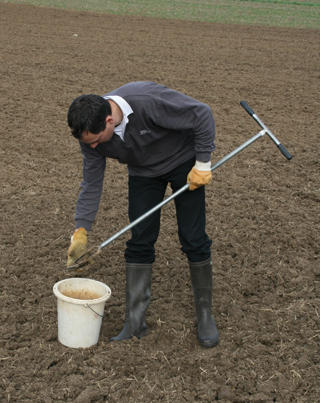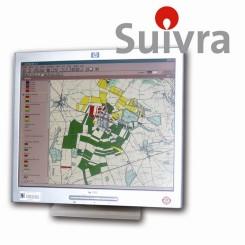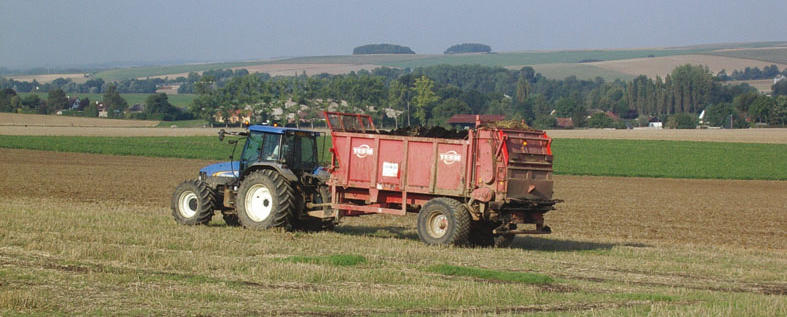SEDE helps you to set up the monitoring of your spreading, by providing agronomic advice to your partner farmers.
Do you want to comply with regulations and guarantee the smooth running of the channel to user farmers?
In the context of the agronomic monitoring of spreading, SEDE will provide all the regulatory documents:
- Planned Spreading Schedule
- Annual Spreading Summary
- Delivery notes
- Nitrogen declaration (Brittany)
- Spreading record
- Update of the screening study
All the data used to draw up these documents is processed using our agronomic monitoring software SUIVRA, coupled with a GIS (Geographic Information System). This software ensures the traceability of the sector, from producer to plot.
SEDE can become actively involved in the spreading itself, by directly supervising the providers.
You then benefit from a turnkey landspreading service: from preliminary study to spreading implementation.
Have the quality of sludge and soil checked by an expert

SEDE offers regular monitoring of by-products, to validate their agronomic interest and their harmlessness during application. The soils are also tested before spreading, to check their aptitude to receive these by-products. The analyses are geo-referenced.
The analyses are carried out by COFRAC laboratories and the results are processed by our spreading monitoring-specific software.
Agronomic advice and farmers relations
SEDE assists farmers with personalised information and advice adapted to their plots of land, based on the analysis of by-products and soils. This enables these by-products to be integrated into each farmer's fertilisation practices.
Dematerialised agronomic monitoring of spreading

SUIVRA is a complete management tool for by-product recovery chains. Its great functional richness makes it the reference software for the follow-up of spreading in agriculture.
This digital platform allows us to ensure a quantitative and qualitative follow-up of the plot spreading operations, with batch management:
- Analytical monitoring: capture of the results of the analyses of agronomic parameters, trace metal elements, organic trace compounds, micro organisms, flow of MTEs over 10 years
- Soil monitoring: balance of pre- and post-application soil tests
- Crop monitoring: input sheet - list of crops
-
Follow-up of exploitation: list of spreading, allotment sheet, product follow-up sheet
The SUIVRA software ensures traceability and can transmit all the information by remote declaration (SANDRE format). An extranet can also be set up to facilitate the exchange of information between all sector stakeholders.
PRODUCT MONITORING
SUIVRA provides quantitative and qualitative monitoring of all types of products over several years.
The product sheet established makes it possible to determine the origin of the product, but also its nature and method of production. Analysis orders are directly generated and thanks to the integrated regulatory limit values, SUIVRA also makes it possible to ensure compliance with regulations.
CHANNEL MANAGEMENT
SUIVRA manages and records the flows of the by-product whatever its final destination (agricultural recycling, composting, digestion, incineration, cement works, etc.) allowing total traceability when tracking your spreading operations.
FARM MONITORING
SUIVRA collects all the data concerning agricultural holdings in a 'farm identity sheet'.
The acquisition of these data makes allows plot suitability for spreading to be determined according to their soil and environmental characteristics and their geographical location.
SUIVRA - SIG
SUIVRA has been coupled with a Geographic Information System (GIS) allowing the visualisation, on a map background, of the plots and spreading operations.
SEDE Environnement can thus edit graphical representations of the data inherent to the management of a recycling chain.
Wastewater treatment plant in Laval (France)
The city of Laval has a sewage treatment plant with a nominal capacity of 250 000 p.e. which produces approximately 2 500 t of sludge DM each year.
Today, 2 types of sludge are produced at the treatment plant: limed solid sludge and dry sludge dried by solar greenhouses. All the sludge production is valorised in agricultural spreading.
Between 2007 and 2012, the wastewater treatment plant was the subject of numerous works which, among other things, made it possible to treat all of its sludge production by digestion.

A full range of services
After having carried out in 2008 the updating of the application plan file for authorization, the city of Laval entrusted SEDE with the agronomic follow-up of the spreading of its sludge in 2010.
Since 2011, SEDE also carries out the spreading on the perimeter plots. This concerns 40 farmers spread over 4,368 ha, in 45 communes in the department.
Until now, all the lime sludge produced is delivered on a run-of-river basis to different storage sites at farmers' homes. This transport, carried out by the local authority, requires a great deal of organisation and logistical planning.
SEDE, in regular contact with the station manager, takes an active part in organising deliveries and in channel throughout the year.Spreading monitoring and implementation in Laval
To carry out its spreading operations, SEDE calls upon several agricultural contractors distributed over the entire spreading perimeter. This allows greater flexibility in the choice of dates for spreading on their plots, along with high-performance equipment adapted to each type of sludge.
In 2015 the spreading perimeter was updated following the construction work on the LGV West high-speed railway line. On this occasion, the updated spreading perimeter was integrated into the SILLAGE platform. The order relating to the spreading plan was amended to set up specific monitoring of phosphorus in soil and on farms, with a major component of specific fertilisation advice.


